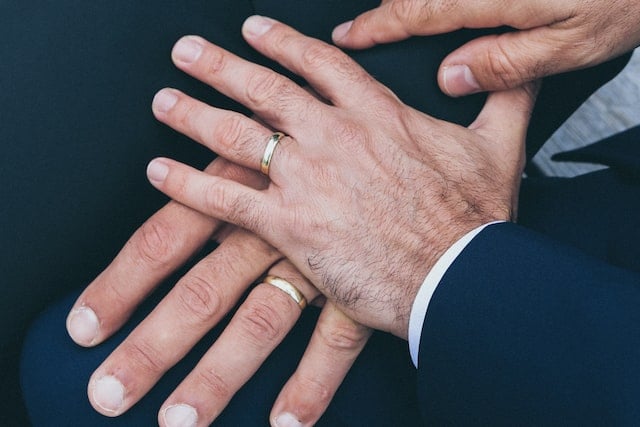What changes (and what doesn't) when you get married in Switzerland

Whether its your name, taxes, or inheritance, getting hitched in Switzerland not only has personal, but financial consequences for newlyweds. Here’s what changes – and what doesn’t – when you say ‘I do’ in Switzerland.
Your name
Since January 1st 2013, tying the knot in Switzerland no longer has any effect on your or your spouse’s surname. Instead, married couples keep their surnames after marriage unless they themselves decide to change it. This also applies to same-sex couples who choose to register their partnership.
Bear in mind that if both parties decide to keep their surnames intact and plan on having children in the future, they will need to decide on a surname for their future children at the time of marriage - and not once the baby is born or adopted.
Citizenship
Much like with your surname, getting married in Switzerland won’t affect your citizenship as each partner will keep their nationality.
For Swiss people, this also means that women get to keep their own place of origin — Heimatort in German, lieu d’origine in French, and luogo di attinenza in Italian — on official documents rather than automatically take on their husband’s, as was the case before 2011.
Read more on the topic here:
READ ALSO: Why Swiss passports show ancestry rather than birthplace.
Though a marriage does not affect your citizenship directly, marrying a Swiss citizen allows foreigners to obtain Swiss citizenship via a facilitated naturalisation procedure.
In order to qualify for this route, foreigners must be married to a Swiss citizen, have lived for a total of five years in Switzerland, have spent the year prior to submitting the application in Switzerland and must have been married to and living with the Swiss citizen for three years.
In most cases, a citizenship obtained this way is for life (even if the marriage isn’t), but there are also situations when the opposite is true.
READ MORE: Citizenship through marriage: What happens to your Swiss passport in case of divorce?
Taxes
Arguably, one of the most significant changes when you get married in Switzerland occurs within taxes. Namely, you and your partner’s incomes and assets will be combined for tax purposes and must be declared together in a joint tax return.
It’s important to note that you will not be taxed from the very moment you exchange your I do’s, but rather throughout the tax year – meaning if you got married in July 2022, you will be assessed together for the whole of 2022.

Swiss francs. Photo: Pixabay
You’re obligated to share information with your spouse
Upon request, the partners must according to federal law provide each other with information about their income, assets, and debts.
Inheritance
In general, the statutory law of inheritance applies in the event of the death of a spouse provided no other arrangements, such as a will or a marriage or inheritance contract have been drawn up beforehand.
In Switzerland, the spouse always has the right to inherit. The law also dictates that his inheritance claim is protected to a degree by a so-called compulsory portion which cannot be waived by a testamentary arrangement.
Living arrangements
If you’re married in Switzerland, you may only terminate your rental contract with the explicit consent of your spouse. Note that this is even the case if only one party has signed the rental agreement.
This is also the case for owned property. Should you wish to sell a house which is only owned by you but functions as a family home, you will need to have your spouse agree to the sale before negotiating.
Children
In Switzerland, if a child is born to a married couple the husband will automatically be presumed to be the father unless stated otherwise. In the same vein, both parents will be given joint custody – this is also the case in the event of divorce.
Acquired property
If you and your spouse choose to forgo a marriage contract, the ‘participation in acquired property’ regime, also known as ordinary regime, applies upon your marriage.
This means that each person gets to keep all assets they owned prior to the marriage, and any assets received as gifts or inherited during the marriage. This is known as ‘own property’.

A married couple. Photo by Nick Karvounis on Unsplash
Each married person also independently manages the savings accumulated during the marriage, such as in the form of a salary or bank interest. This is also known as ‘acquired property’.
Pension
Any money that was paid into the pension fund prior to marriage belongs to the individual person. After marriage, however, the money belongs to both parties.
In the event of a divorce, the money paid into the pension fund is divided. The person who paid more into the pension fund during the marriage owes the other person their share in the second pillar.
You will be expected to support your spouse
Married spouses in Switzerland must provide both moral and financial support to their spouse whenever necessary.
Comments
See Also
Your name
Since January 1st 2013, tying the knot in Switzerland no longer has any effect on your or your spouse’s surname. Instead, married couples keep their surnames after marriage unless they themselves decide to change it. This also applies to same-sex couples who choose to register their partnership.
Bear in mind that if both parties decide to keep their surnames intact and plan on having children in the future, they will need to decide on a surname for their future children at the time of marriage - and not once the baby is born or adopted.
Citizenship
Much like with your surname, getting married in Switzerland won’t affect your citizenship as each partner will keep their nationality.
For Swiss people, this also means that women get to keep their own place of origin — Heimatort in German, lieu d’origine in French, and luogo di attinenza in Italian — on official documents rather than automatically take on their husband’s, as was the case before 2011.
Read more on the topic here:
READ ALSO: Why Swiss passports show ancestry rather than birthplace.
Though a marriage does not affect your citizenship directly, marrying a Swiss citizen allows foreigners to obtain Swiss citizenship via a facilitated naturalisation procedure.
In order to qualify for this route, foreigners must be married to a Swiss citizen, have lived for a total of five years in Switzerland, have spent the year prior to submitting the application in Switzerland and must have been married to and living with the Swiss citizen for three years.
In most cases, a citizenship obtained this way is for life (even if the marriage isn’t), but there are also situations when the opposite is true.
READ MORE: Citizenship through marriage: What happens to your Swiss passport in case of divorce?
Taxes
Arguably, one of the most significant changes when you get married in Switzerland occurs within taxes. Namely, you and your partner’s incomes and assets will be combined for tax purposes and must be declared together in a joint tax return.
It’s important to note that you will not be taxed from the very moment you exchange your I do’s, but rather throughout the tax year – meaning if you got married in July 2022, you will be assessed together for the whole of 2022.

You’re obligated to share information with your spouse
Upon request, the partners must according to federal law provide each other with information about their income, assets, and debts.
Inheritance
In general, the statutory law of inheritance applies in the event of the death of a spouse provided no other arrangements, such as a will or a marriage or inheritance contract have been drawn up beforehand.
In Switzerland, the spouse always has the right to inherit. The law also dictates that his inheritance claim is protected to a degree by a so-called compulsory portion which cannot be waived by a testamentary arrangement.
Living arrangements
If you’re married in Switzerland, you may only terminate your rental contract with the explicit consent of your spouse. Note that this is even the case if only one party has signed the rental agreement.
This is also the case for owned property. Should you wish to sell a house which is only owned by you but functions as a family home, you will need to have your spouse agree to the sale before negotiating.
Children
In Switzerland, if a child is born to a married couple the husband will automatically be presumed to be the father unless stated otherwise. In the same vein, both parents will be given joint custody – this is also the case in the event of divorce.
Acquired property
If you and your spouse choose to forgo a marriage contract, the ‘participation in acquired property’ regime, also known as ordinary regime, applies upon your marriage.
This means that each person gets to keep all assets they owned prior to the marriage, and any assets received as gifts or inherited during the marriage. This is known as ‘own property’.

Each married person also independently manages the savings accumulated during the marriage, such as in the form of a salary or bank interest. This is also known as ‘acquired property’.
Pension
Any money that was paid into the pension fund prior to marriage belongs to the individual person. After marriage, however, the money belongs to both parties.
In the event of a divorce, the money paid into the pension fund is divided. The person who paid more into the pension fund during the marriage owes the other person their share in the second pillar.
You will be expected to support your spouse
Married spouses in Switzerland must provide both moral and financial support to their spouse whenever necessary.
Join the conversation in our comments section below. Share your own views and experience and if you have a question or suggestion for our journalists then email us at [email protected].
Please keep comments civil, constructive and on topic – and make sure to read our terms of use before getting involved.
Please log in here to leave a comment.